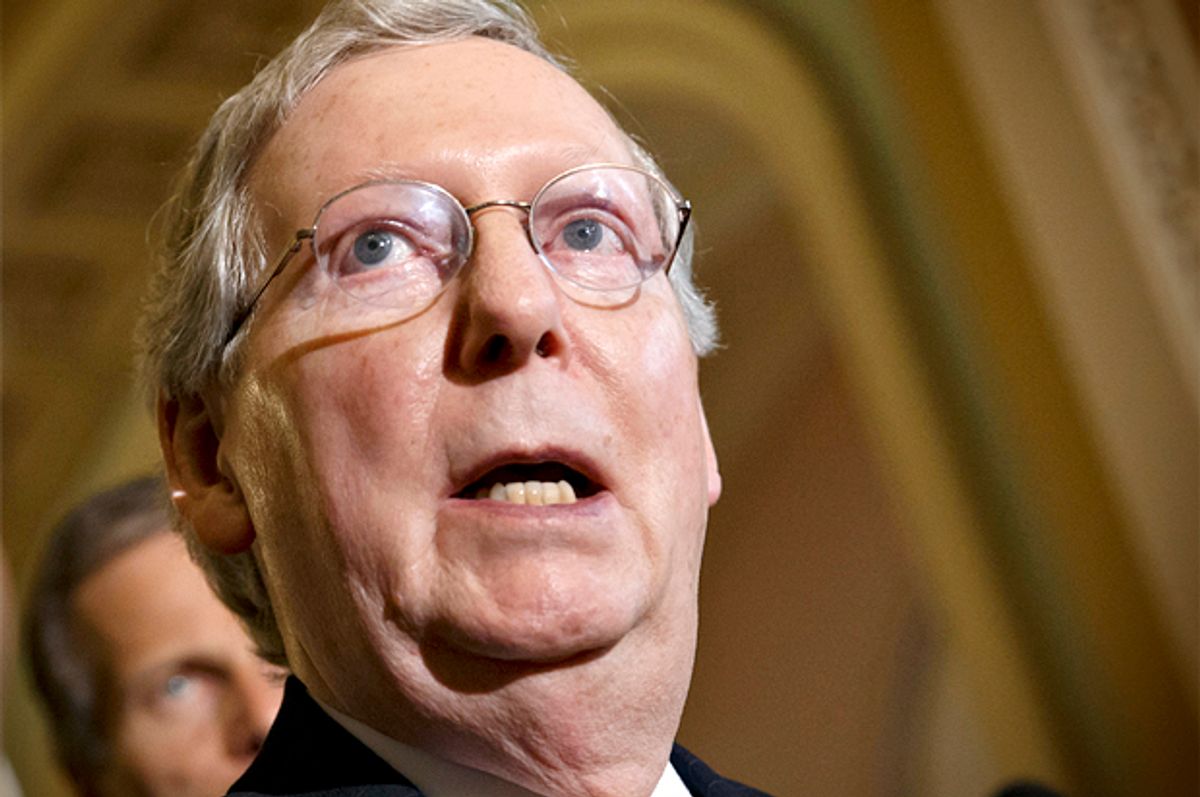Based on the press coverage of last night’s Kentucky Senate debate, you’d hardly know that Mitch McConnell made a damn fool of himself. The would-be Senate majority leader made some transparently ridiculous policy arguments and hilariously inept claims to “bipartisanship,” but all that was completely overshadowed by the question of whether Alison Lundergan Grimes voted for Barack Obama.
Bloomberg Politics: Grimes Doubles Down on Vote Secrecy In Kentucky Senate Debate
ABC News: Kentucky Senate Debate: Democratic Challenger Refuses to Answer Whether She Voted for Obama
CNN: Alison Lundergan Grimes repeats refusal to say whether she voted for President Obama
Washington Post: Grimes defends choice not to say if she voted for Obama, citing wish to protect privacy
CBS News: The simple question Alison Lundergan Grimes wouldn’t answer – again
Los Angeles Times: Did she vote for Obama? Kentucky Senate candidate still won't say
Grimes’ attempts to dance around the issue have been awkward, and her explanation at last night’s debate that she was “not going to compromise a constitutional right” by divulging her vote was no exception. But the question of who Grimes voted for matters far less than the policy considerations at play in the Kentucky Senate race. And the coverage of the debate has badly obscured just how flagrantly deceptive McConnell’s policy arguments were.
Everyone’s talking about McConnell’s comments about the Affordable Care Act in Kentucky, and I’ll get to those in a second, but first I want to focus on something McConnell said at the very beginning of the debate. Confronted with the notion that he’d be nothing but an obstructionist in the role of majority leader, McConnell boasted of his ability to compromise with the Democrats. “There have been three major bipartisan agreements during the Obama years,” McConnell said, noting that he’d negotiated all of them with Vice President Joe Biden. “The December 2010 two-year extension of the Bush tax cuts, the August 2011 Budget Control Act, the fiscal cliff deal on New Year’s Eve of 2012.” Per McConnell: “I’m prepared to negotiate with the other side when we can find areas of agreement.”
For those of us who recall each of those grand bipartisan agreements, the idea that they’re representative of Mitch McConnell’s willingness to compromise is a bit of a joke. The 2011 Budget Control Act and the 2012 tax deal came about because the government was facing two manufactured crisis points: the deadline for raising the debt ceiling and the fiscal cliff. Without deals in those situations, the country would have defaulted on its debt and probably slipped back into recession. So McConnell’s argument basically boils down to “I’m prepared to negotiate with the other side, but only when the alternative is economic catastrophe.” Otherwise he’s happy to be an intransigent barrier to any sort of progress. McConnell summed up his philosophy on “compromise” in early 2011: “If the president is willing to do what I and my members would do anyway, we’re not going to say no.”
On the Affordable Care Act, McConnell revisited last night his ridiculous and untenable position: Obamacare has to be repealed, but the parts of Obamacare that are working in Kentucky – its Kynect healthcare exchange and the Medicaid expansion – can stay, somehow.
Kentucky Kynect is a website. It was paid for by a $200-and-some-odd million grant from the federal government. The website can continue. But in my view, the best interest of the country would be achieved by pulling out Obamacare root and branch.
This is straight-up bullshit. And it’s been straight-up bullshit for the months and months that McConnell’s been saying it in public. Without the Affordable Care Act, there is no Kynect. Period. Full stop. End of story. This argument is simple to debunk and glaringly dishonest.
Let’s stick with McConnell’s “root and branch” metaphor, since it’s descriptive and actually works pretty well for showing how absurd his position is. Think of healthcare reform as a tree. The ACA and its various funding mechanisms as the “roots” of that tree. Programs like Kynect are its branches, and their success depends on federal regulations and subsidies for (otherwise very expensive) health plans. McConnell wants to get rid of the tree’s roots. But he also says the branches, deprived of their structural support and means of sustenance, can somehow remain aloft. You don’t have to be an arborist to know that trees don’t work that way.
McConnell’s slippery nonsense on the issue is a direct consequence of healthcare reform’s remarkable success in his state. Back when the ACA was stumbling and bumbling through its rollout, McConnell was harshly critical of Kynect and treated it as a symptom of the Affordable Care Act’s perceived failure. “Kentucky has gotten more money to set up its exchange than every state except California, New York, Oregon, and Washington,” McConnell said on the Senate floor in January. “That’s a lot of money. And they’ve still only enrolled 30 percent of the people they were supposed to at this point. How is that a success?”
Since then, Kentucky has become one of the ACA’s more compelling success stories. Kynect and the state’s Medicaid expansion helped Kentucky cut its uninsured rate from over 20 percent in 2013 to under 12 percent this year – the second largest drop for any state. Over half a million Kentuckians signed up for coverage, an estimated 75 percent of whom were previously uninsured. Put simply: healthcare reform in Kentucky is working.
McConnell is trying to trick people into believing that he can eliminate “Obamacare” while at the same time leave the successful parts of Obamacare untouched. He can’t. And the only way he can get away with that garbage argument is if reporters refuse to challenge him on it.



Shares